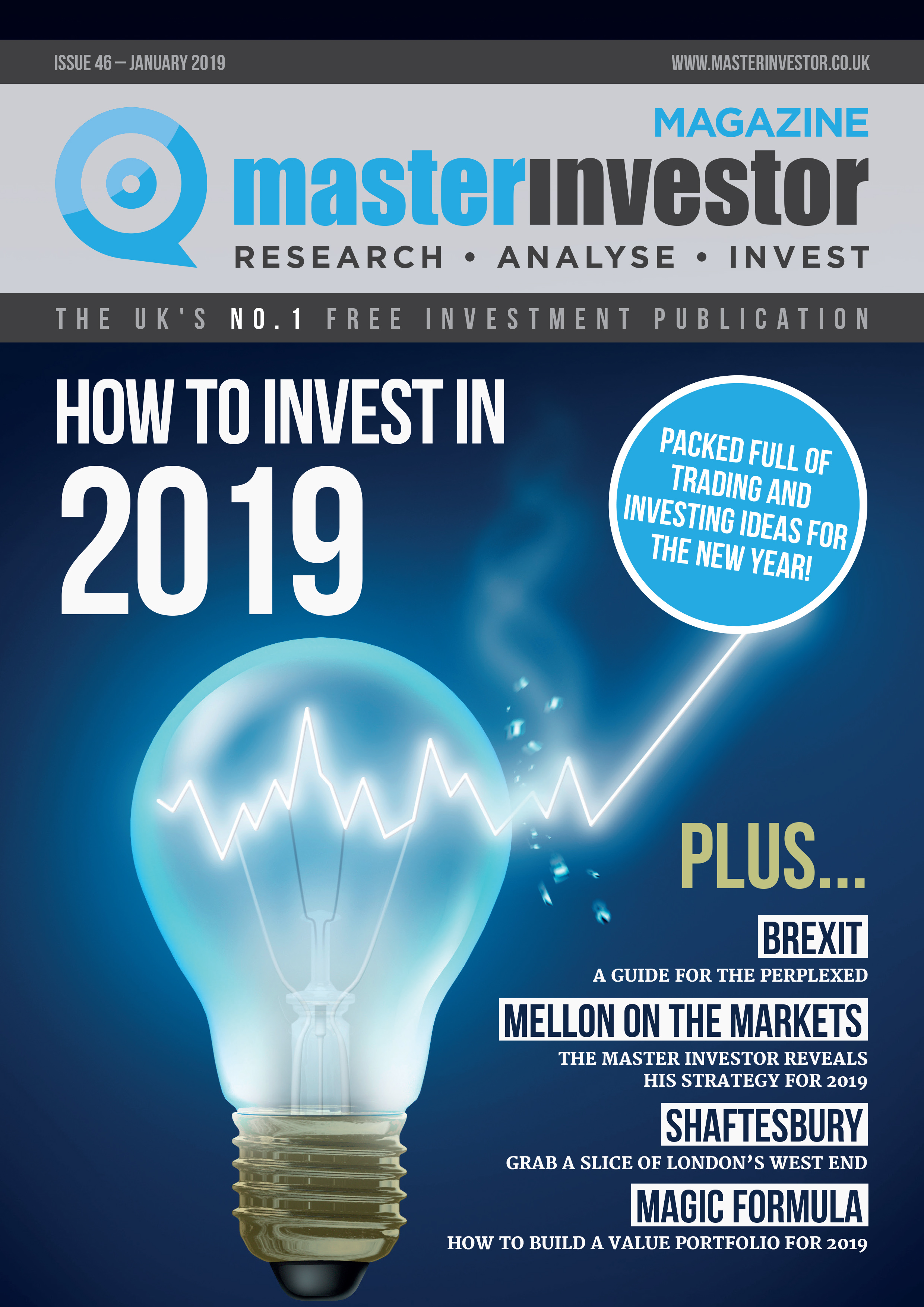Mellon on the Markets: Keep some powder dry

I have learned from my mistakes and I am sure I can repeat them exactly.
– Peter Cook
Thank God for snow on the ground here in Brussels, as I write this dutiful missive and tuck into my waffle. I really was beginning to worry that there would be no winter and that we Europeans were heading the way of my friends in Australia – who are frying, seriously, and in genuinely life-threatening heatwaves.
| This article will be featured in the upcoming issue of Master Investor Magazine
Never miss an issue of Master Investor Magazine – sign-up now for free! |
And yet, in an era of undoubted climate change, energy policy in Europe remains cack-handed. Germany still clings to lignite, a form of dirty brown coal that accounts for nearly half of its energy generation. This is partly due to the suspension of nuclear power in the country and also the power of the mining unions in the East. It is absolutely bonkers that Europe’s economic powerhouse (and now, possibly, ex-powerhouse!) is still using the techniques of the industrial revolution to produce its energy. On top of that, Germans pay excessive energy bills, due to the offsetting of massive investments in green energy, some of which are already obsolete and certainly ill thought out. Germany is no good at grands projets.
And in the UK, the situation isn’t much better. Withdrawal of subsidies for green energy has meant a slowdown in investment in the wind and solar that the UK is well suited to (sometimes), and a cancellation of tidal wave projects. The suspension of work on Japanese funded nuclear plants is another blow, and this at a time when, in my opinion, nuclear, now safe and totally clean, should be a key part of our industrial strategy.
France, meanwhile, though not normally thought of as a leader in sensible economic thinking, generates about 80% of its power from nuclear and people seem quite happy with that. Yes, nuclear is initially expensive, and the clean-up after a plant is decommissioned is expensive also, but overall the guarantee of energy security, the safety and the lack of any emissions surely make it worthwhile.
Melting snow, melting valuations
As the Belgian snow melts, so do valuations in stock markets. It is of course the case that stock markets and other financial markets tend to herald or presage events. In the case of stock markets, which have been generally off the boil around the world since October of last year, prescience in falling values has been shown up in the delayed statistics which underline the reasons why.
One, central banks have generally been dialling back their monetary support to asset prices, and (in the case of the Bank of England and the Federal Reserve) actually shrinking their bloated balance sheets. This is good news, in the sense that it moves financial markets, at least in the US and the UK into a phase of normalisation. But it does have dramatic effects on overpriced markets, notably housing and stock markets, and this is now being seen, as values erode.
Second, it makes share buybacks – such a key feature of the outperformance of US equity markets in recent years – more expensive and less attractive, particularly as the withdrawal of monetary easing has an effect on real economic growth and therefore on earnings. As I have warned before, earnings are now also being impacted by the tight labour market which is leading to cost-push pressures and a diminution of industrial and services margins.
Plus, you have the slowdown (surely inevitable!) in China and the trade war engineered by Trump, whether you agree with him or not.
Of course, the European Central Bank (ECB) is still relatively accommodative, and with the remarkable slowdown in the eurozone (who would have thought that the UK would be the standout major economy in Europe?!), with industrial production collapsing and sentiment eroding – and with banks still not fixed – the ECB will surely retain a dovish stance.
The Bank of Japan, bless it, keeps on pumping money into an economy that doesn’t respond with any increase in inflation, despite rising real wages. In a way, Japan (the most attractive of major markets, though the UK runs a close second) is becoming increasingly statist, with the government (through the Bank of Japan and the Ministry of Finance) owning huge swathes of equity and of course, most of its own debt. How they get out of this monetary mess, other than just using write-offs, is beyond me.
So, markets have been falling, though in a pretty volatile way. My lesson from years of both bitter and sweet experiences in markets is that once this starts it goes a lot further than you can imagine. So it is today. If the FANG (Facebook, Amazon, Netflix, Google) stocks look relatively cheap now, they will get cheaper. If the S&P looks like it has reverted to the mean, the mean is going to be something else when it eventually bottoms.
Keep some powder dry
Bear markets – and we are now in one – rarely end in anything other than a dramatic sell off and we haven’t had that yet. It is going to come, but not for a while.
And yet – in a world of diminishing cash returns (bonds have risen once again) there are attractive dividend-yielding stocks out there.
Victor Hill, who is a top analyst and man, thinks that UK banks are to be avoided. I am not so sure. I think Lloyds (LON:LLOY), with a good dividend yield, is worth tucking away. Yes, banks such as Metro (LON:MTRO) (what exactly is the point of Metro?) are so much froth, but the big behemoths like Lloyds or even HSBC (LON:HSBA), which offers an excellent exposure to Asia, are surely worth considering at what must be very depressed levels.
| This article will be featured in the upcoming issue of Master Investor Magazine
Never miss an issue of Master Investor Magazine – sign-up now for free! |
Don’t touch European banks though, as there is still too much uncertainty as to whether or not they have properly resolved their capital positions.
So overall, the message is to retain dry powder. And that begs the question – in which currency? My nap for the year was sterling against almost anything, but particularly the euro, and that is working out. My call on gold and silver seems to be happening and a slice through $1,300 on gold and $18 on silver is close – really close!
As for bonds, I was right last year but they have clawed back recently. It is certainly the case that though interest rates may rise, they will only do so gently, but negative-rate bonds are still nuts, 10-year gilts at 1.5 per cent are ridiculous – and should be avoided big time.
Italian government bonds, having collapsed and then risen like the phoenix, are now once again shortable. I believe that the eurozone is about to go through another crisis. European elections coming up in May will surely lead to more populists and flag waving. It will not be a pretty time.
Meantime, the omens are that Mrs May will probably get her deal – with some nudging by the EU – through parliament, and that will propel GBP a bit further.
I won’t get political here, but I will say that people on both sides of the argument should hang their heads in shame. And especially those who proposed that the UK would crash and burn after the vote, and then kept on going to the top of the mountain and crying wolf again and again. Europe is and always has been the problem. I know what I would do if I had any influence, but political action is a foolish move in a fever-tree economy and my opinions from now on will be confined to how to make money.
Oh, and how to live longer and healthier! On that subject, I am off to the Caribbean for two days this weekend to proselytise on that very topic, and then to the great A360 conference organized by my chum Peter Diamandis in Los Angeles.
Buy, sell, buy – it can wait a while!
Happy hunting!
Jim Mellon

You were lucky not to get caught up into Patisserie valerie. Your non political stance seems mistimed, looks like Italy is about to go into a recession like you have been predicting. I hope it gives us a upper hand in negotiations.
I’ll tell you what is the point of Metro. Have you tried opening a business account lately with one of the Big 4 high street banks? I’d rather have root canal treatment from an unqualified dentist!
Went into Metro on a Saturday afternoon with no appointment, talked to a real person and walked out half an hour later with my account, debit card and online banking set up and ready to use.